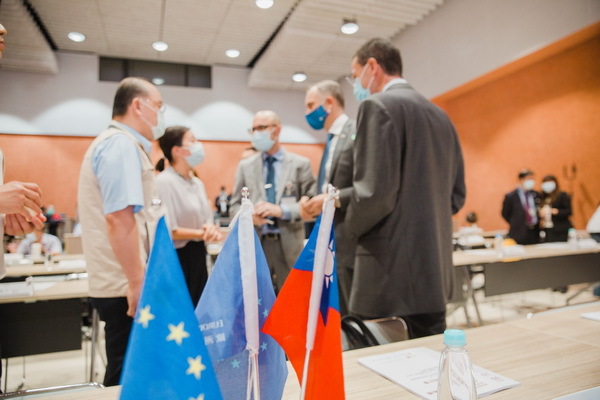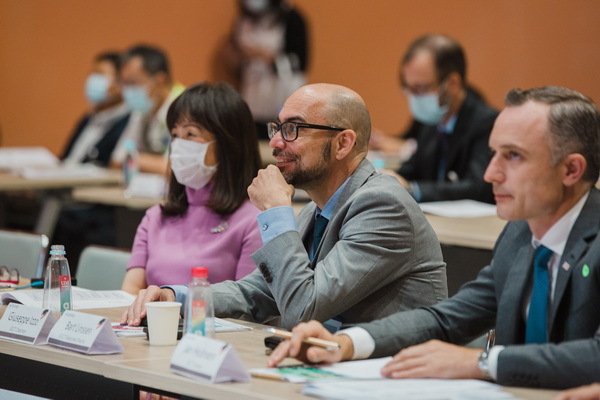Low Carbon City Goes Smarter: NCKU, the SIA, the ECCT, and Tainan City Cooperate in Shalun
On September 10th, National Cheng Kung University (NCKU) signed a Memorandum of Understanding with the European Chamber of Commerce Taiwan (ECCT) on a MoU Signing Ceremony, where the ECCT also signed a fresh new MoU with the Shalun Innovation Alliance (SIA), an industry-government-academia platform initiated by NCKU. Vice President Lai Ching-te expressed through a letter that the opportunity for discussions between experts in different fields would foster great progress in the area of sustainable development.
Following the MoU Signing Ceremony, the 2020 Low Carbon City Conference was jointly hosted by NCKU, the ECCT, the SIA and the Tainan City Government to deepen the conversation on topics related to renewable energy, smart transportation, circular economies, and smart healthcare.
Dr. Huey-Jen Jenny Su, President of NCKU and also the Convener of the SIA, showed her appreciation to the participating parties for their commitment to forming an innovative ecosystem. Standing at the frontline of smart city development, NCKU, the SIA, the ECCT, and Tainan City open up more chances to integrate different sectors in the years to come. “We are walking on a new trail that has not been given a try before,” said Dr. Su regarding the partnership.

NCKU, SIA, ECCT, and Tainan Government cooperate for a sustainable future.
NCKU and the ECCT started collaboration for the purpose of talent cultivation in 2013, intended both to encourage NCKU students with their studies and support them in their career paths. Joint programs with BOSCH and PwC Sustainability in recent years have offered opportunities for students to explore ways to apply their knowledge and expertise. Taking a step forward, now the objective of the joint work includes building a greener future together.
The common goal to better the environment with greener development motivates the four-party conference. NCKU, the ECCT, the SIA, and the Tainan City Government are working together to look for sustainable solutions on the path of economic development.
In the last eight years, the ECCT’s Low Carbon Initiative (LCI) has consecutively sponsored the Low Carbon City Conference with the Tainan City government on an annual basis. ECCT Chairman Giuseppe Izzo expressed his pleasure at beginning a new chapter in the organization's cooperation with the SIA in 2020. With the hope to spark further cooperation in the area of low carbon science technology, Giuseppe Izzo looks forward to the sharing of expertise and knowledge between industry and academia. Tainan City is stepping up to act as a leader in promoting sustainable development in Taiwan, he said.

Low Carbon City Conference seeks sustainable solutions to economic development.
Tainan City Deputy Mayor Hsu Yue-Dian commended the ECCT for their continuous assistance to the city government by proposing recommendations for building a low carbon city. Europe has always been the forerunner in sustainable development and low carbon city development, and the ECCT offers practical recommendations to help the Taiwanese government build a sustainable future. According to Deputy Mayor Hsu, the highlighted goals proposed in ECCT’s 2020 position paper, creating a 5G-friendly environment, promoting smart mobility, and accelerating energy transition, are Tainan City Government’s policy priorities. The deputy mayor expressed his pleasure to witness the gathering of such an exceptional business collaboration towards environmental protection.
NCKU led the establishment of the Shalun Innovation Alliance in May of this year. Combining the strength of academia, industry, and government, the triple-helix system fosters the growth of a greener future.

Shalun is expected to become a smart low carbon city through academia-industry-government cooperation.
Dr. Su pointed out that Shalun gained substantial attention over the past few years as it became the focal center for renewable energy. With participation from academia, industry, and the government, who are all looking to meet the sustainable development goals, Shalun is further expected to become a green science city. (Writing by Hsu Tsu-yueh)